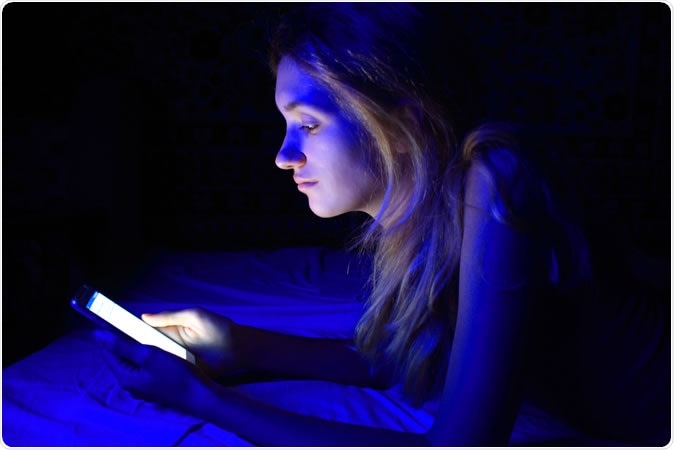The sun provides warmth and a bright light with orange-yellow hues during the day. But at night, cold, dim, and white light from the Moon, which exposes people to light similar to blue wavelengths emitted by various types of artificial lighting. Previously, blue light has been dubbed as disruptive to a good night’s sleep.
Now, a new study says that blue light is not as disruptive to sleep as previously thought, as it signals the brain that it’s night time because it mimics the colors of twilight.

Image Credit: Tenenbaum / Shutterstock
In this new study published in the journal Current Biology, blue light may not be disrupting sleep patterns, contrary to common belief, or at least not as much as night mode does. The researchers from the University of Manchester found that using cooler and dim lights in the evening and bright warmer lights in the day may benefit our health more.
Twilight is bluer and dimmer than daylight and the body’s internal clock uses both features to see the right times to be awake or asleep. At present, certain devices and technologies limit the exposure to blue light at night. For instance, some smartphones automatically change their color at a certain time in the evening. The researchers believe that these may provide the body with mixed messages and can confuse the body’s clock.
These blue light filters in the evening may actually make it harder to fall asleep since people are exposed to unnatural levels of warm light during a time of the day when natural light is cold and dim.
The body’s internal clock
To further understand blue light’s effect on sleep, the circadian rhythm is defined as a cycle that regulates hormones, temperature, and digestion as it works non-stop for 24 hours a day. Sunrise and sunset naturally regulate human sleep patterns and due to light exposure, the body determines how alert or tired people feel.
The eye has photoreceptors that filer light, including one protein dubbed as melanopsin. It measures daylight brightness and reduces the production of melatonin, the sleep-inducing hormone. Melanopsin tells certain parts of the brain to stay alert and awake, hence, keeping people on-the-go during the day.
Blue light better than night mode
The study, which was carried out on laboratory mice, utilized specialized lighting that allowed the researchers to adjust its color without changing brightness. They found that blue colors made weaker effects on the body clock of the mice than equally yellow colors.
The researchers also found that all lights are stimulating, and, in this case, a blue light appears to be less stimulating than yellow light. Hence, the study suggests that yellow has a stronger effect on the human circadian rhythm and blue, dim, and cooler light is more conducive for sleep than warmer, yellow light.
“We show the common view that blue light has the strongest effect on the clock is misguided; in fact, the blue colors that are associated with twilight have a weaker effect than the white or yellow light of equivalent brightness,” Dr. Tim Brown, from The University of Manchester, said.
"There is lots of interest in altering the impact of light on the clock by adjusting the brightness signals detected by melanopsin but current approaches usually do this by changing the ratio of short and long wavelength light; this provides a small difference in brightness at the expense of perceptible changes in color,” he added.
The researchers say that using cooler and dim lights at bight and bright warm lights in the day may benefit health more and induce better sleep. Further, the study also found that aligning the body clocks with work schedules can be good for health.
There are limitations of the study since mice are nocturnal, but the researchers emphasize that the basic way light affects the body’s internal clock is the same in all mammals, including humans. However, they recommend further research to confirm the findings, since the study has not been studied in humans yet. In the future, they suggest that tests should be performed in people to ascertain that the findings are the same as humans.
Journal reference:
Cones Support Alignment to an Inconsistent World by Suppressing Mouse Circadian Responses to the Blue Colors Associated with Twilight Mouland, Joshua W. et al. Current Biology, Volume 29, Issue 24, 4260 - 4267.e4, https://www.cell.com/current-biology/fulltext/S0960-9822(19)31368-5